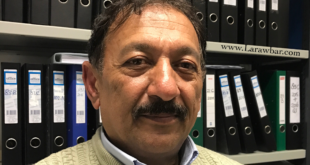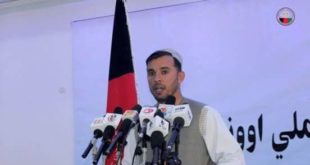 Book Review By:
Book Review By:
Dr. Rahmat Rabi Zirakyar (Independent Scholar), U.S.A
Apparently, Alia has suffered from active Mullah, Marx, Mujahid, and Talib, corrupt and passive political ruling elite, and “brotherly” and “friendly” foreign aggressors.
An Unbelievable story of sadness, survival and struggle in two extremely different societies unfolds in a book by Alia Rawi Akbar: “Afghan Women Under the Shadow of Terror and Politics” (Metropolitan Publishing, USA, 2009), pp. xii+188.
Alia is a tough and talented Afghan woman. She is a brilliant storyteller with the ability to skillfully connect dots. She writes poems in Pashto and Farsi, enjoys painting, and reveres sophism. Her book is an anguished cry for justice, fairness and emotional respect. It is a celebration of uncommon courage for an Afghan woman to tell the truth about her own life, thought and feeling as well as to illuminate the hidden hearts beneath the thick skin of a very traditional Afghan society.
Born in Afghanistan, Alia now lives in Virginia, USA. She is a serious, rebellious and intellectual woman, who published a deeply sincere book. It provides a devastating critique of international power plays in her native country Afghanistan. Also, it sheds light on the rise and fall of competing internal forces subservient to great powers and instrumental to socio-political dynamics in the best interest of their sponsors. These destructive mechanisms expanded her original pain caused by the social rules of the very traditional Afghan society. This way, Alia brought together an inside story of not only her personal challenges in the Afghan society but also of the turmoil and destruction of her native country by foreign powers and their Afghan stooges. Since1978, Afghanistan’s decades of war and struggle brought more suffering to Afghan woman, who have very little or no chance to support their remaining living relatives. Alia’s tale is an inside look at her turbulent traditional Afghan society and her personal journey into the constantly changing modern American society, whose power elite is involved in Afghanistan’s turmoil as well as in killing innocent civilians and marginalizing Pashtuns-Alia’s tribe which makes up the majority of the Afghan population.
The style of her book is free of academic jargon while presenting blunt analyses of realities of the Afghan women’s life. Through this book, Alia channeled the pressure of her psycho-political frustration, suffering and sadness. It is a truly informative book for political scientists, sociologists, psychologists, social workers, and women of all walks of life, especially for Afghan women. Here are a few quotations from Alia’s book:
“For a while, politically, a fraction of Setamies (a Farsi group of pro-China Communists who were against Pashtuns with Ahmad Shah Massoud’s and Rabani’s group) struggled, through their media and newspapers, to change the historical name of Afghanistan.” P.100). “Pashtuns are called the backbone of Afghanistan and their mainland is Afghanistn, which was divided by British colonial forces in 1893. Ethnically and nationally, Pashtuns are called Afghans. Pashtun and Afghan have the same meaning….Pashtuns have always loved other Afghans and would stand for any person, from any ethnic group, who could bring peace and tranquility to the country.” (p.109) “The Taliban and Massoud were played by foreign countries and weakened the real concern of Afghans during the war. Many woman and children were raped and killed, sold and brutalized by Russian and Afghan communists, by the Committee of Nezar, led by Massoud from the Afghan Tajiks, by Dustam’s militias from the Uzbeks, by theWahdat group of Hazara from Hazara’s (Moghuls) tribe, and by Pakistanis…. The victims suffered mentally and physically, but still, the US sided with the rapists and murderers of innocents, the looters of houses and the national wealth of Afghanistan including Kabul Museum’s valuables….the Taliban could not have lasted for long, with their hardships and extreme ideas, if America had instead organized the common Pashtuns and non[-]Pashtuns against them far from Northern Alliance….Many crimes were committed against the Pashtuns and the country was sold to strangers….They got all involved in the ethnic war….A question comes to mind: Did the US really want Osama that badly, or was the goal to get rid of the Taliban and the Pashtuns?” (pp. 117-119). “Regardless of my dislike of the Taliban and the Northern Alliance’s leaders, I was in favor of my own people-Afghans of both sides. The Farsi-speaking people were under the influence of the Northern Alliance’s propaganda machine but now most[of them] know about the reality. I also became in favor of Pashtun Khwa[Pashtunkhwa] and interested in the unity and freedom of all Pashtuns on both sides of the border with Pakistan, as well as the return of our land by Pakistan.” (p.125). Alia does not exempt the feminist majority in America from her critique because they do not “ scream” now when innocent civilians-among them women and children-are killed by the civilized world’s ( U.S. and NATO) bombardments in Afghanistan: “At this stage of history, US government has done the same things that the USSR [former Soviet Union] did with its puppet governments, killing innocent women and children in their gatherings in front of other people’s eyes, with their bombardment. Now the feminist majority should scream and gather money to support Afghan women politically in the name of women and children’s rights in Afghanistan, as they had done in the time of the Taliban with celebrity in California by excuse of Hejab(veil) for their own advantage, and other political groups in other places also has done the same things, but other facts than hejab or veil show how crimes are still being committed, and how women can’t attain decent life style…they need help and how they can live secure from physical, sexual harassments and assaults and other crimes against them….”(pp. 37-38)
.
 لراوبر ویب پاڼه لراوبر يو افغان – تازه خبرونه
لراوبر ویب پاڼه لراوبر يو افغان – تازه خبرونه


